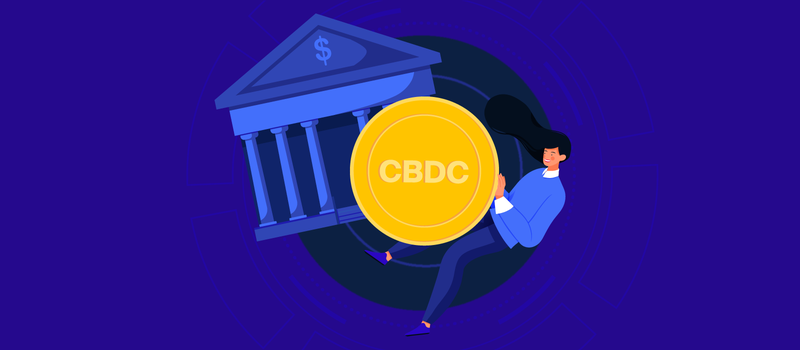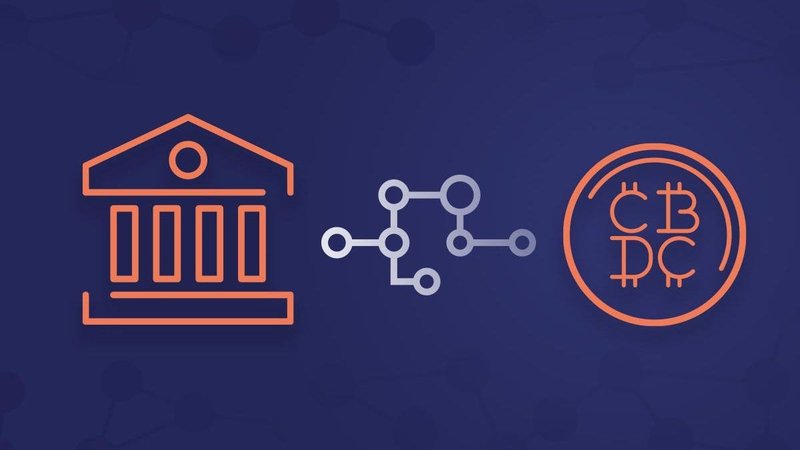Central Bank Digital Currency (CBDC)
5 minutes
Beginner
The emergence of cryptocurrencies on the global financial scene has been creating challenges for centralized fiat finance for quite some time, and now many countries are considering the concept of CBDC (Central Bank Digital Currency) to address the threat to fiat finance.
Central Bank Digital Currency (CBDCs) is a digital currency issued by a country's central bank, with its value tied to the national fiat currency.
Several countries, including India and the United Kingdom, already have plans to launch CBDCs, such as the digital rupee and digital pound, respectively. While CBDCs are positioned as cryptocurrencies, their centralized nature appears to be entirely contradictory to the principles of the cryptocurrency community - decentralization.
What is the Central Bank Digital Currency?
Central Bank Digital Currency (CBDC) is a form of digital fiat currency token used by the issuing country, as mentioned earlier. The issuing country uses a private blockchain ledger instead of an open-source blockchain.
According to governments planning to issue CBDC, they are doing so to protect their citizens from losing money due to bad investments in unregulated cryptocurrency markets. However, centralized CBDCs do not provide privacy or full control over one's funds and transactions, which makes it difficult to gain support from cryptocurrency/Web3 enthusiasts.
How do Central Bank Digital Currencies work?

Central bank digital currency can be seen as a bridge between centralized and decentralized finance. Backed by the government's central bank, CBDCs can be issued and responsible for managing various types of blockchain nodes associated with the crypto asset. It is also possible that CBDCs could be modeled in such a way that a unified ledger would be supported based on decentralized principles, although the level of decentralization is expected to be modest at best.
How safe are Central Bank Digital Currencies?
Until now, many countries have assured that central bank digital currencies will be free from the market volatility of traditional cryptocurrencies. They are backed by national fiat currencies, so price fluctuations will undoubtedly be less. This will be similar to privately issued stablecoins, albeit with government support and permission.
Types of Central Bank Digital Currencies (CBDC)

At the moment, we can categorize future central bank digital currencies into two categories based on factors such as the types of blockchain nodes used, the wallet used to store assets, banking options provided, and more. Based on these parameters, these types of CBDC are considered available for public use:
- Retail central bank digital currencies
Currently, this is the most preferred type of CBDC, as it provides financial stability for end-users as the government directly supports the asset. These are centrally issued digital tokens, the value of which is pegged to the country's fiat currency. - Wholesale central bank digital currencies
Another popular type of CBDC blockchain may be wholesale, used by the country's central financial institutions. Banks and other leading institutions will use them for secure and rapid processing of transactions, than traditional financial methods. A decentralized ledger used for wholesale CBDCs can even be used for cross-border payments between financial institutions.
Advantages and disadvantages of Central Bank Digital Currencies
As many in the crypto space have already pointed out, central bank digital currencies have advantages and disadvantages. These would be:
Advantages
The benefits of central bank digital currencies include:
- This eliminates the risks of major bank failures or bank fraud.
- This reduces the time and cost required for cross-border payment by automating the verification process and reducing the number of approvals required from regulatory agencies.
- CBDCs complement the fiat currencies to which they are pegged and have good exchange value.
- Also, you will not need to be physically present at banks to use financial services.
Disadvantages
The disadvantages of CBDC include:
- CBDCs do not meet the main ideals of blockchain technology, that is, decentralization.
- CBDCs do not provide financial anonymity for users.
Examples of central bank digital currencies
The Bahamas was one of the first countries to launch its Sand Dollar digital token. The token is issued by the central bank of the Bahamas, and the institution centrally controls the digital currency.
China has already begun using its digital yuan in many provinces. It is now being used for subway services, tax payments, bus transportation, and more.
Nigeria became the first African country to launch its digital fiat currency, eNaira. It is based on a centralized blockchain.
Even the U.S. has calculated the costs and benefits of issuing its digital currency. The same goes for India, as it has also announced plans to issue a digital rupee.
Conclusion
Although the basic principle of cryptocurrencies is to create a decentralized network of financial transactions, CBDC is still some progress when it comes to mass adoption of cryptocurrencies. This means that governments around the world are ready to understand the potential of different types of blockchain nodes and registries.
CBDCs can be especially good for those who do not yet want to engage in cryptocurrency, but also want to avoid the traditional banking system.



